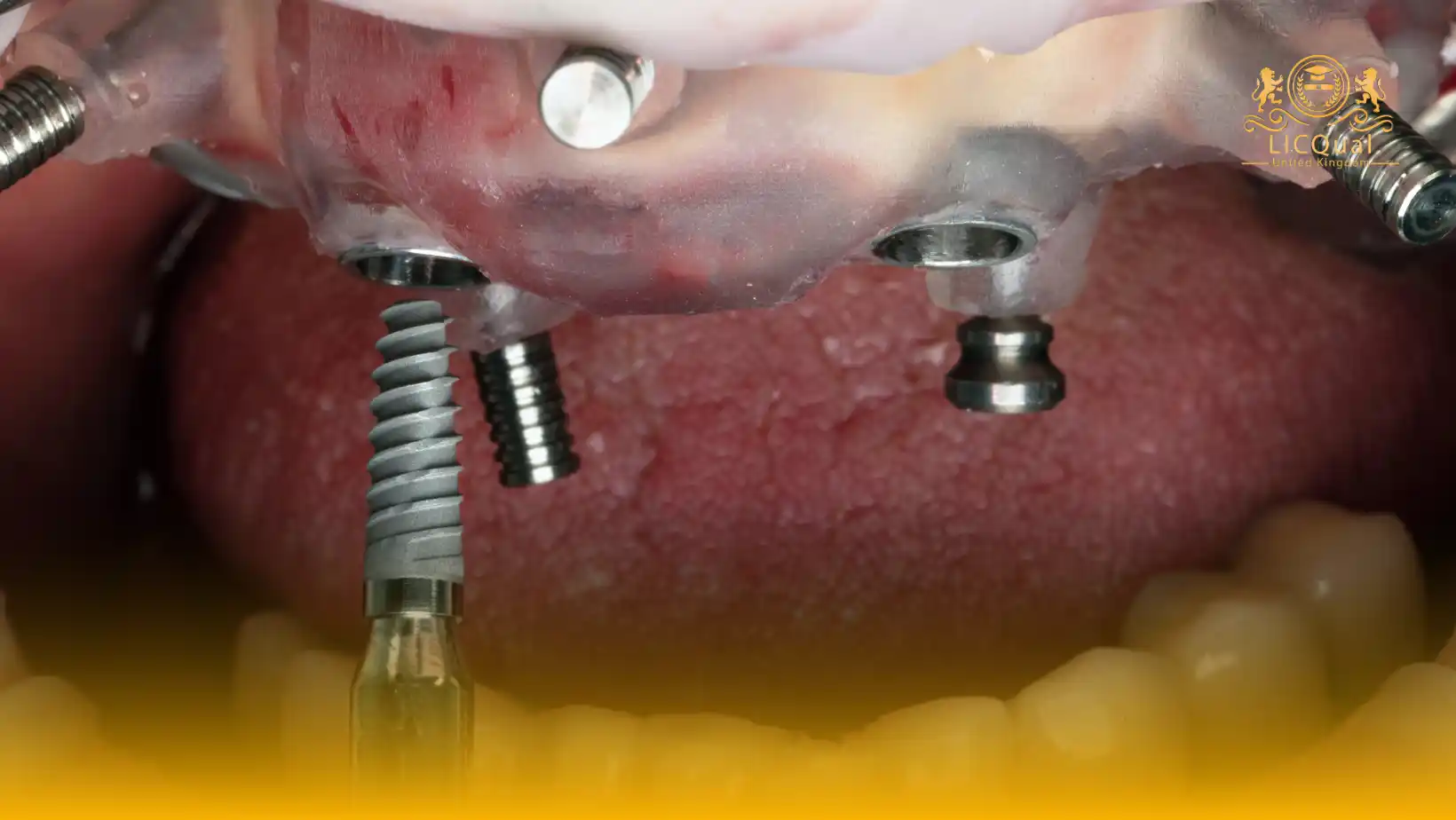The LICQual Level 6 Diploma in Implant Dentistry (Dip Implant Dentistry) is a prestigious qualification designed for dental professionals seeking to advance their expertise in implantology. This Level 6 diploma is not intended for fresh entrants to the dental profession but is tailored for experienced practitioners who wish to enhance their clinical skills, broaden their knowledge, and strengthen their career prospects.
Learners undertaking this qualification will gain a comprehensive understanding of dental implant placement, restoration, and maintenance, alongside patient assessment, treatment planning, and surgical techniques. The programme combines in-depth theoretical knowledge with practical, hands-on training, ensuring learners develop the critical skills required to provide safe, effective, and aesthetically pleasing implant treatments. Additionally, the course contributes significantly to Continuing Professional Development (CPD), supporting learners in maintaining up-to-date expertise and achieving excellence in implant dentistry.
Centres delivering the LICQual Level 6 Diploma in Implant Dentistry are required to maintain the highest standards to ensure learner success. This includes employing competent and qualified staff, providing access to fully equipped clinical facilities, and ensuring all necessary instruments, materials, and resources are available for practical training. Such measures guarantee a high-quality, engaging educational experience that enables learners to apply their knowledge confidently in real-world clinical settings.
Whether you aim to specialise further in dental implantology, improve patient outcomes, or enhance your professional credentials, this diploma offers a structured pathway for ambitious dental professionals committed to excellence in implant dentistry.
Course Overview
Qualification Title
LICQual Level 6 Diploma in Implant Dentistry (Dip Implant Dentistry)
Total Units
6
Total Credits
120
GLH
480
Qualification #
LICQ2200679
Qualification Specification
To enroll in the LICQual Level 6 Diploma in Implant Dentistry (Dip Implant Dentistry), applicants must meet the following criteria:
|
Qualification# |
Unit Title |
Credits |
GLH |
|---|---|---|---|
|
LICQ2200679-1 |
Principles of Implant Dentistry |
20 |
80 |
|
LICQ2200679-2 |
Implant Surgical Techniques |
20 |
80 |
|
LICQ2200679-3 |
Prosthetic Rehabilitation on Implants |
20 |
80 |
|
LICQ2200679-4 |
Management of Complex Implant Cases |
20 |
80 |
|
LICQ2200679-5 |
Evidence-Based Practice and Research in Implant Dentistry |
20 |
80 |
|
LICQ2200679-6 |
Professional Practice, Ethics, and Continuing Development |
20 |
80 |
By the end of this course, learners will be able to:
Unit 1: Principles of Implant Dentistry
- Demonstrate an in-depth understanding of dental implantology, including bone biology and osseointegration.
- Analyse factors influencing implant success and failure.
- Evaluate patient selection criteria and perform risk assessments for implant procedures.
- Apply theoretical knowledge to support clinical decision-making in implant dentistry.
Unit 2: Implant Surgical Techniques
- Plan and perform surgical placement of dental implants safely and effectively.
- Demonstrate competence in flap design, osteotomy preparation, and implant insertion.
- Apply protocols for asepsis, infection control, and patient safety during surgical procedures.
- Evaluate surgical outcomes and adapt techniques to individual patient needs.
Unit 3: Prosthetic Rehabilitation on Implants
- Plan and execute prosthetic restorations on dental implants.
- Integrate restorative principles with implant placement to optimise function and aesthetics.
- Assess occlusion, soft tissue management, and long-term maintenance of implant restorations.
- Critically evaluate treatment outcomes to inform future practice.
Unit 4: Management of Complex Implant Cases
- Assess and plan complex implant cases, including multiple implants, full-arch restorations, and bone grafting.
- Apply problem-solving strategies for surgical and prosthetic challenges.
- Evaluate treatment outcomes and modify plans to optimise patient care.
- Demonstrate professional judgement in managing complex implant treatments.
Unit 5: Evidence-Based Practice and Research in Implant Dentistry
- Critically appraise contemporary research and literature in implant dentistry.
- Apply evidence-based principles to clinical decision-making.
- Conduct small-scale research or audits relevant to implant practice.
- Analyse findings to improve professional practice and patient outcomes.
Unit 6: Professional Practice, Ethics, and Continuing Development
- Demonstrate understanding of ethical, legal, and professional responsibilities in implant dentistry.
- Implement best practices in patient communication, consent, and clinical governance.
- Develop and maintain a personal CPD plan for continuous professional growth.
- Reflect on professional practice to enhance clinical skills and patient outcomes.
The LICQual Level 6 Diploma in Implant Dentistry (Dip Implant Dentistry) is designed for dental professionals who want to specialize in implantology and deliver advanced restorative solutions. This Implant Dentistry Level 6 diploma is ideal for dentists, graduates, and specialists who aim to expand their clinical expertise, enhance patient outcomes, and gain an internationally recognized qualification. Whether you are a practicing dentist, an academic, or an international professional, this accredited Implant Dentistry diploma provides the skills, flexibility, and credibility to grow your career.
1. Practicing Dentists Seeking Implant Expertise
- Dentists aiming to specialize in implant dentistry
- Professionals who want to expand treatment options for patients
- Those seeking an internationally recognized Dip Implant Dentistry qualification
- Practitioners interested in complex implant case management
- Dentists looking to increase patient trust and referrals
2. Recent Dental Graduates
- Fresh graduates eager to specialize early in Implant Dentistry
- Students seeking a career‑boosting postgraduate diploma
- Graduates who want to stand out in a competitive dental job market
- Learners looking for flexible online Implant Dentistry courses
- Young professionals aiming for global recognition in dentistry
3. International Dental Professionals
- Dentists from Pakistan, UK, Middle East, and worldwide
- Professionals seeking a globally accredited Implant Dentistry diploma
- Those who want to study through a flexible online format
- Practitioners aiming to meet international implantology standards
- Dentists looking to expand career opportunities abroad
4. Dental Specialists Expanding Skills
- Prosthodontists and orthodontists adding implant expertise
- Specialists aiming to broaden treatment capabilities
- Professionals seeking continuing professional development (CPD)
- Those who want to integrate implantology into existing practice
- Dentists pursuing multi‑disciplinary collaboration
5. Academic and Teaching Professionals
- Dental educators seeking updated implant dentistry knowledge
- Academics aiming to enhance teaching credentials
- Trainers who want to mentor future implant dentists
- Researchers looking for internationally recognized qualifications
- Educators seeking evidence‑based implant dentistry training
6. Healthcare Professionals in Dental Care Teams
- Allied dental professionals interested in implantology training
- Community health workers aiming to support implant treatments
- Professionals collaborating with implant dentistry specialists
- Practitioners working in oral rehabilitation programs
- Those seeking interdisciplinary dental healthcare knowledge
7. Career‑Focused Dental Practitioners
- Dentists aiming for career advancement in Implant Dentistry
- Professionals looking to increase credibility and recognition
- Practitioners seeking higher earning potential through specialization
- Dentists preparing for leadership roles in clinics and institutions
- Professionals committed to lifelong learning and excellence
To ensure learners receive high-quality training and achieve successful outcomes, centres delivering the LICQual Level 6 Diploma in Implant Dentistry must meet rigorous standards. These requirements include:
- Qualified and Competent Staff: Centres must employ experienced and appropriately qualified dental educators with expertise in implant surgery, prosthodontics, and restorative dentistry.
- Clinical Facilities: Centres should provide fully equipped dental clinics or practical environments that allow learners to safely perform advanced implant procedures.
- Access to Required Materials and Instruments: All necessary surgical instruments, implant systems, restorative materials, and modern technologies must be available to support hands-on training.
- Teaching and Learning Resources: Centres must provide access to up-to-date textbooks, journals, digital tools, and research materials to support theoretical learning.
- Compliance with Health and Safety Standards: Centres must adhere to all relevant regulations to ensure a safe and professional learning environment.
- Assessment and Quality Assurance: Centres must implement robust systems to monitor learner progress, conduct assessments, and maintain quality assurance in line with international standards.
- Support for Learners’ CPD: Centres should encourage and facilitate Continuing Professional Development, enabling learners to apply new knowledge and skills effectively in clinical practice.
Meeting these centre requirements ensures learners gain comprehensive theoretical knowledge, advanced clinical skills, and professional competence, fully aligned with international standards for Level 6 implant dentistry training.
Assessment and Verification
All units within this qualification are subject to internal assessment by the approved centre and external verification by LICQual. The qualification follows a criterion-referenced assessment approach, ensuring that learners meet all specified learning outcomes.
To achieve a ‘Pass’ in any unit, learners must provide valid, sufficient, and authentic evidence demonstrating their attainment of all learning outcomes and compliance with the prescribed assessment criteria. The Assessor is responsible for evaluating the evidence and determining whether the learner has successfully met the required standards.
Assessors must maintain a clear and comprehensive audit trail, documenting the basis for their assessment decisions to ensure transparency, consistency, and compliance with quality assurance requirements.







